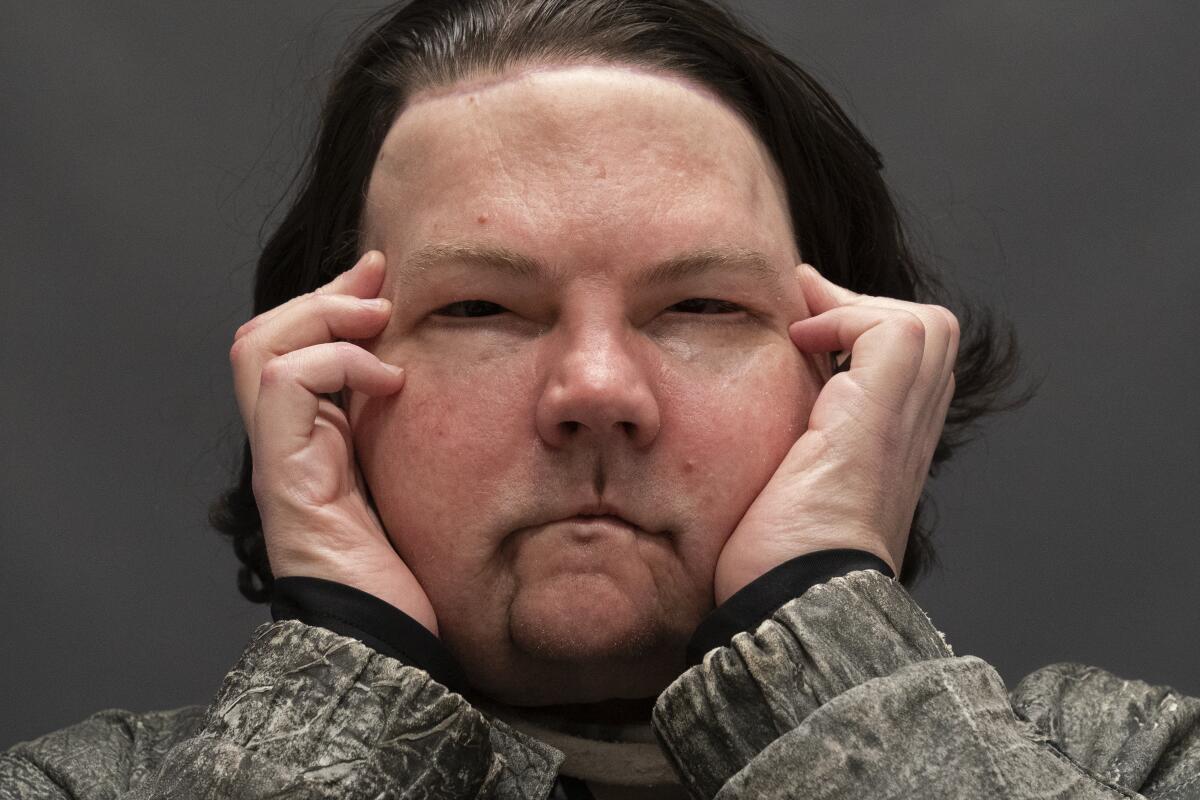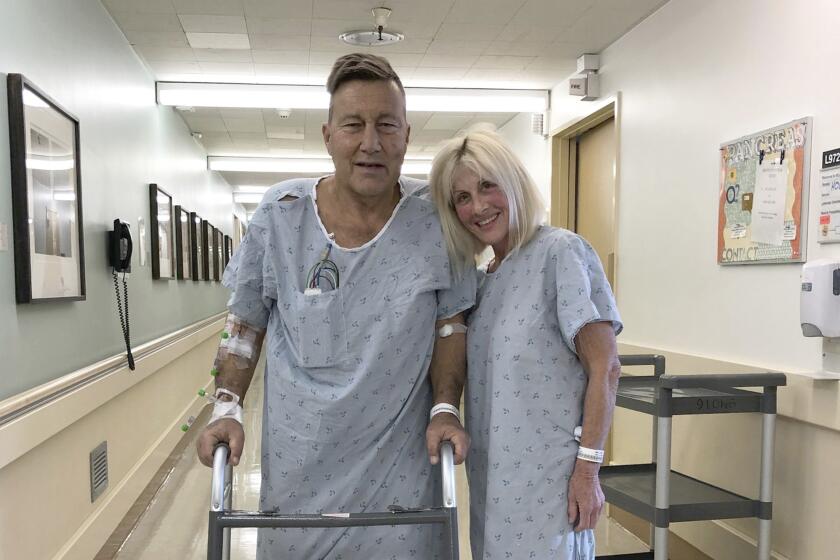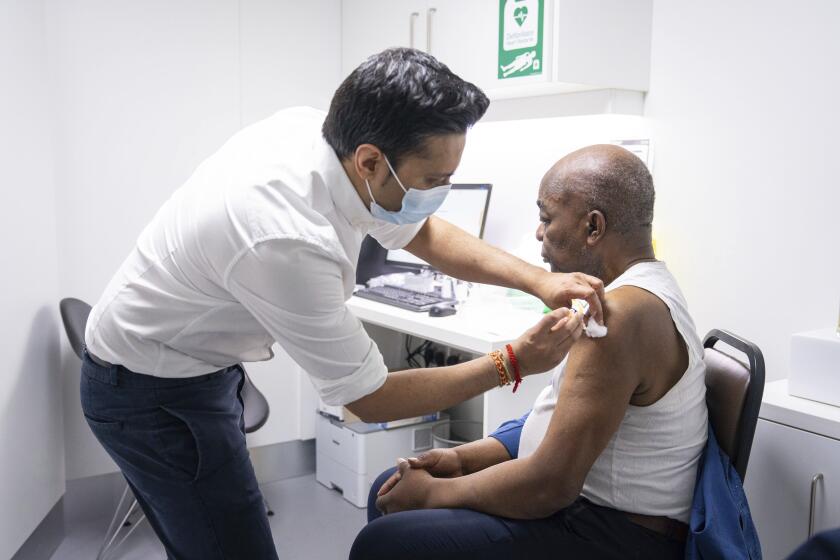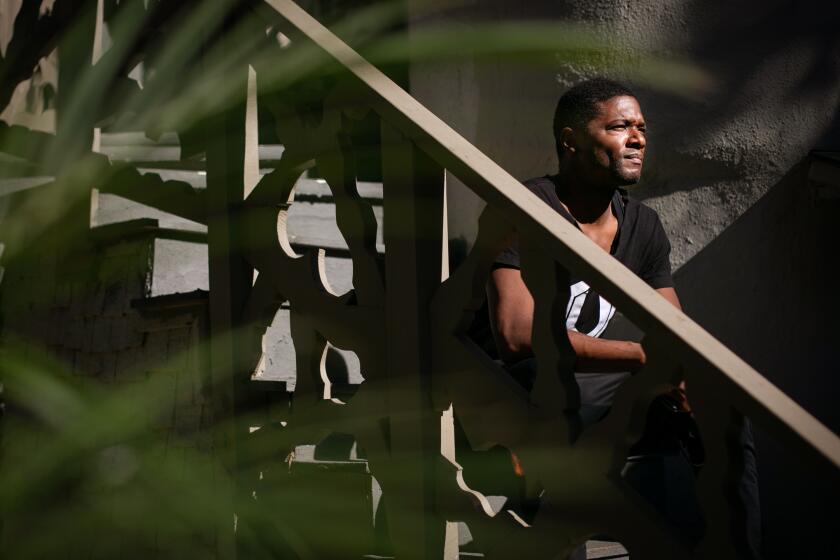‘New chance at life’: Man gets new face and hands in rare double transplant

- Share via
NEW YORK — Almost six months after a rare face and hands transplant, Joe DiMeo is relearning how to smile, blink, pinch and squeeze.
The 22-year-old New Jersey resident had the operation in August, two years after being badly burned in a car crash.
“I knew it would be baby steps all the way,” DiMeo told the Associated Press recently. “You’ve got to have a lot of motivation, a lot of patience. And you’ve got to stay strong through everything.”
Experts say it appears that the surgery at NYU Langone Health was a success, but warn that it’ll take some time to say for sure.
Worldwide, surgeons have completed at least 18 face transplants and 35 hand transplants, according to the United Network for Organ Sharing, or UNOS, which oversees the U.S. transplant system.
But simultaneous face and double hand transplants are extremely rare and have only been tried twice before. The first attempt was in 2009 on a patient in Paris, who died about a month later from complications. Two years later, Boston doctors tried it again on a woman who was mauled by a chimpanzee, but ultimately had to remove the transplanted hands days later.
A woman being treated at the Cleveland Clinic has an almost entirely new face following the most extensive facial transplant ever performed, the medical center said Tuesday.
“It’s incredibly complicated. It’s a tremendous success,” said Dr. Bohdan Pomahac, a surgeon at Boston’s Brigham and Women’s Hospital who led the second such attempt.
DiMeo will be on medications the rest of his life to avoid rejecting the transplants, as well as continued rehabilitation to gain sensation and function in his new face and hands.
In 2018, DiMeo fell asleep at the wheel of his car, he said, after working a night shift as a product-tester for a drug company. The car hit a curb and utility pole, flipped over and burst into flames. Another driver who saw the accident pulled over to rescue DiMeo.
Afterward, he spent months in a medically induced coma and underwent 20 reconstructive surgeries and multiple skin grafts to treat his extensive third-degree burns.
Organ transplants plummeted as the coronavirus spread. Doctors in the U.S. and France cut way back on the procedures to avoid putting living donors at risk.
Once it became clear that conventional surgeries could not help him regain full vision or use of his hands, DiMeo’s medical team began preparing for the risky double transplant in early 2019.
“Within the world of transplantation, they’re probably the most unusual,” said Dr. David Klassen, UNOS’ chief medical officer.
Almost immediately, the NYU team encountered challenges, including finding a donor.
Doctors estimated that DiMeo had only a 6% chance of finding a match compatible with his immune system. They also wanted to find someone of the same gender, skin tone and hand dominance.
During the search for a donor, the COVID-19 pandemic hit, and organ donations plummeted. During New York’s coronavirus surge, members of the transplant unit were reassigned to work in COVID-19 wards.
In early August, the team finally identified a donor in Delaware and completed the 23-hour procedure a few days later.
They amputated both of DiMeo’s hands, replacing them mid-forearm and connecting nerves, blood vessels and 21 tendons with hair-thin sutures. They also transplanted a full face, including the forehead, eyebrows, nose, eyelids, lips, both ears and underlying facial bones.
“The possibility of us being successful based on the track record looked slim,” said Dr. Eduardo Rodriguez, who led the medical team of more than 140 people. “It’s not that someone has done this many times before and we have a kind of a schedule, a recipe to follow.”
A study finds that the AstraZeneca-Oxford University vaccine cut coronavirus transmission by two-thirds and prevented COVID-19.
So far, DiMeo has not shown any signs of rejecting his new face or hands, said Rodriguez.
Since leaving the hospital in November, DiMeo has been in intensive rehabilitation, devoting hours daily to physical, occupational and speech therapy.
“Rehab was pretty intense,” DiMeo said, and involves a lot of “retraining yourself to do stuff on your own again.”
During a recent session, he practiced raising his eyebrows, opening and closing his eyes, puckering his mouth, giving a thumbs up and whistling. DiMeo can feel his new forehead and hands getting cold, and often reaches up to push his long hair off of his face.
Millions of Americans, especially low-income tenants, are accumulating debt amid the COVID-19 pandemic, threatening to create a downward financial spiral.
DiMeo, who lives with his parents, can now dress and feed himself. He shoots pool and plays with his dog Buster. Once an avid gym-goer, he’s also working out again — benching 50 pounds and practicing his golf swing.
“You got a new chance at life. You really can’t give up,” he said.
As with any transplant, the danger of rejection is highest early on, but lasts indefinitely. The medications he takes also leave him vulnerable, for the rest of his life, to infections.
“You’re never free from that risk,” Klassen said. “Transplantation for any patient is a process that plays out over a long period of time.”
Still, Rodriguez said he’s amazed to see that DiMeo has been able to master skills like zipping up his jacket and putting on his shoes.
“It’s very gratifying to all of us,” Rodriguez said. “There’s a tremendous sense of pride.”
More to Read
Sign up for Essential California
The most important California stories and recommendations in your inbox every morning.
You may occasionally receive promotional content from the Los Angeles Times.















